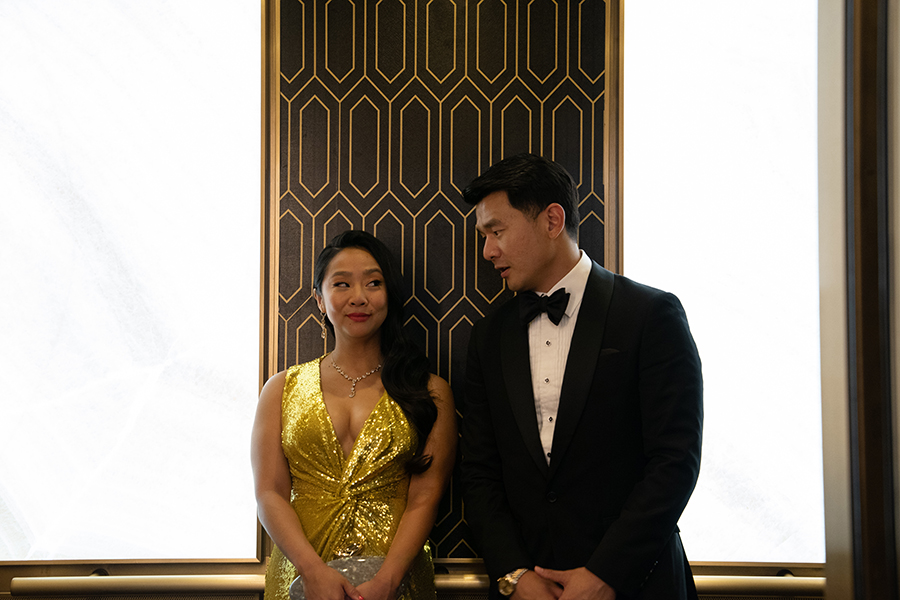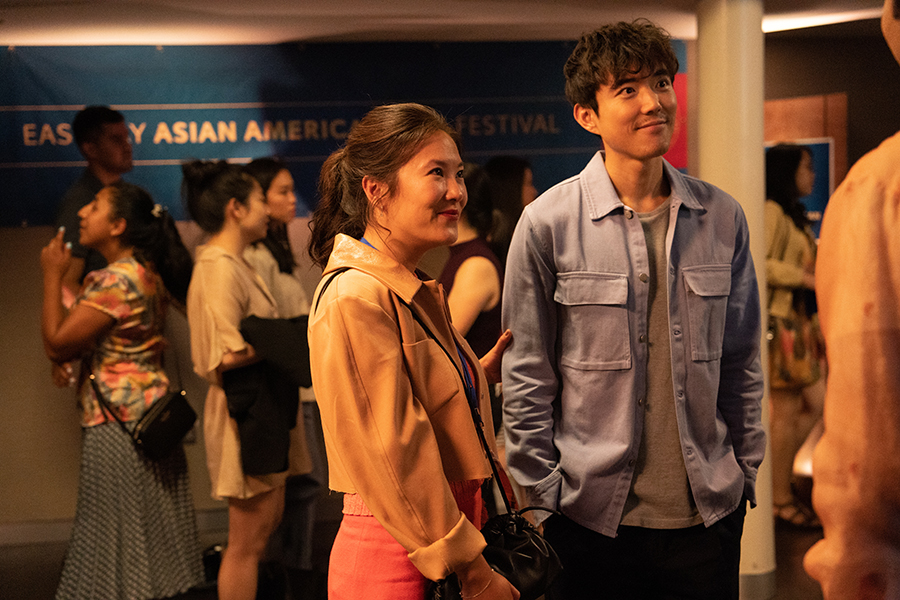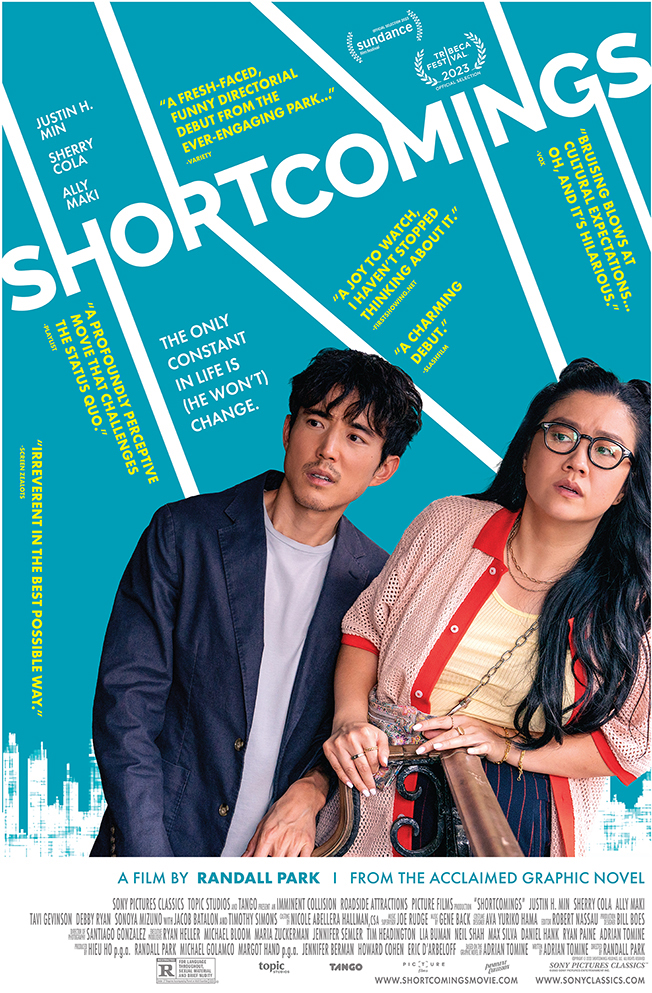By Kai Curry
NORTHWEST ASIAN WEEKLY
It’s worth discussing similarities and differences between acclaimed graphic novel, “Shortcomings,” by Adrian Tomine and Randall Park’s movie-directing debut, “Shortcomings,” starring Justin H. Min as Ben, Ally Maki as Miko, and Sherry Cola as Alice.
First, I didn’t realize there would be so many similarities! The movie script is almost a line-by-line read of the graphic novel, with some parts left out and some parts added, of course—but not many! It’s updated. The movie that Ben and Miko come out of in the beginning is now definitely a not-thinly-veiled-at-all reference to “Crazy Rich Asians” and representation at any cost.
Let’s start there. “Shortcomings”—the graphic novel and movie—has the guts to address several issues pertinent to AAPIs that I have decided to call “edgy.” The fact that the graphic novel was written back in 2007, though, has the effect of making the movie not as edgy as you think it is, and the effect of making you go, “Damn, we still haven’t resolved all this?” The main issues related to AAPI’s are: whether “anything goes” is fine if it represents and…dating white people.

In “Shortcomings,” a CRA-like movie featuring Stephanie Hsu and Ronnie Chieng as “Mr. and Mrs. Wong” sets off a discussion on AAPI representation. (Sony Pictures Classics)
There, it’s out there. Miko accuses Ben of “settling” for her because he has a wandering eye for white girls. He watches white girl porn, and as soon as he has the chance, he dates/tries to sleep with two white girls, Autumn (Tavi Gevinson) and Sasha (Debby Ryan).
Ben is also your basic manipulative, gaslighting narcissist whose answer to everything is to blame everyone else, call them “crazy,” and say he was “just joking.” His response to Miko discovering him watching the porn is “it’s supposed to be different from reality,” whereas Miko tells him, “You’re obsessed with the typical western media beauty ideal.” Touché. Does Ben just like what he likes? Is he really “settling”? Has he been manipulated since childhood by growing up in the U.S. to like white girls?
IMHO, the actors danced around the issues when interviewed by the Weekly and were not as outright as the film and graphic novel, even though they took part in it. In other words, too many are still uncomfortable talking about this kind of thing.
“Adrian does such an amazing job on touching on the interracial dating aspect,” Maki acknowledged but generalized when she added that the story analyzes “from a lot of different perspectives” and “there’s not one right perspective.” I’m not sure the last part is true. Maybe the “right perspective” is what Park, who appears as a restaurant owner in the film, says, “I’m more into the content of one’s character.”
Moving onto representation. I loved the natural after-the-movie unpacking feel of the convo between Ben and Miko as they walk out of the CRA-ish film at the start of the movie. I was pleased that they were unpacking much needed subject matter that I supposed Park and his friends had been mulling over since CRA came out.

Ben (Justin H. Min) after watching a CRA-like movie with his girlfriend Miko (Ally Maki). (Sony Pictures Classics)
“It’s a little glossy but it’s ours,” says Miko. “As a community, we’ve waited a long time to see ourselves reflected—” Ben interrupts her, “in a garish mainstream romcom that glorifies a capitalistic fantasy of vindication through wealth and materialism?” Ben, an arthouse theater manager, fancies himself more sophisticated than that.
He also fancies himself as a player. My favorite part of the movie is when Ben tries to kiss Autumn, after an evening of pretending he likes her art. (He likes neither mainstream nor non-mainstream content, it turns out, or maybe he thinks the far ends of the spectrum are pretentious on both sides. Anyway, he likes almost nothing and pretending is his jam.) As an alpha male, he assumes the kiss is a go and just leans in, at which point Autumn physically recoils.
“The body knows better than the mind,” Autumn says. If only more of us were attuned to that.
Again, most of this is in the graphic novel, but it has more punch when seeing it acted out.
“A lot of things that are brought up in the film are difficult to talk about,” Min admitted (I have to ask, why though? Why, why, why?).
“Representation, and how that’s talked about in our community, is still quite difficult when there’s so little representation out there.” Min added, “It’s hard to give honest opinions and feedback about the things that are out there because there are so few things that are out there. It feels like we are obligated to support anything and everything that is Asian.” (By extension, does that also mean supporting dating only Asians?)
For sure, I could relate. I, too, hailed CRA at the time as being great simply for the fact of representing Asians. Ben is up front about his criticism of things outside himself, but that is the only time we know what’s going on with him. He is very ambiguous otherwise, and that is even more present in the graphic novel, probably, which relies heavily on the dialogue, while in the movie we are treated to Min’s absolutely magnificently spot-on portrayal of an asshole.
How does he do it? We asked Jin, who started by side stepping a bit.
“There are people in our lives…who have strong opinions about things, and we either love them or hate them,” but then settled into a convincing answer about people and his craft: “I don’t think anything Ben says is coming from a malicious place, but from his innate passion [that certain things are] right and certain things are wrong. I leaned into that.” Got it. From the outside looking in, though, Ben is massively malicious. He knows how to hurt. Does it come from a place of insecurity? Sure. Is he an aspiring filmmaker, making films? No. Is he jealous of others in the film industry? Likely.
“Shortcomings” the movie and graphic novel’s style aligns perfectly with Park’s trademark snarky sarcasm. Alice, Ben’s LGBTQ+ friend in the story, is the least conflicted and most honest (though not without contradictions). When Ben fails at his relationships with Miko, Autumn, AND Sasha—almost with Alice, too—and fails, thus far, at making something of himself, while everyone else is moving on, it’s Alice who validates our suspicion that Ben is indeed a jerk by advising him, “just stop being a piece of shit” and “just be a nice person.”
At the end of the graphic novel, Ben flies home. He looks outside and then it goes blank. At the end of the movie, too, we can’t be sure if Ben will take Alice’s advice, if he has changed his ways at all. In front of him on the plane is an older Asian woman watching the CRA-ish film. She is crying. Clearly the movie, glossy or not, means something to her. Maybe it’s the story or maybe it’s seeing people that look like her on the screen. Which does matter. Does Ben get that? We’ll never know. His expression says nothing. But the rest of us get it, I think.
So now that we’ve let this all out of the bag—again—let’s keep it out there this time, okay?
Kai can be reached at info@nwasianweekly.com.



